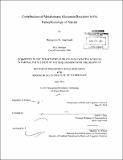Contributions of metabotropic glutamate receptors to the pathophysiology of autism
Author(s)
Auerbach, Benjamin D. (Benjamin David)
DownloadFull printable version (14.83Mb)
Other Contributors
Massachusetts Institute of Technology. Department of Brain and Cognitive Sciences.
Advisor
Mark F. Bear.
Terms of use
Metadata
Show full item recordAbstract
Autism spectrum disorder (ASD) is a complex and heterogeneous disorder, and in the vast majority of cases the etiology is unknown. However, there are many syndromes of known genetic origin that have a high incidence of autism. These highly penetrant syndromic forms of autism offer a unique opportunity for the study of ASD because animal models can be readily engineered to carry the same genetic disruption. Animal models are crucial for understanding neurological disorders at the biological level, and while these monogenic disorders are relatively rare, their animal models are likely to prove indispensable in identifying common pathogenic pathways in ASD and associated intellectual disability (ID). As evidence accumulates from genetic and molecular studies, autism is increasingly being regarded as a disease of the synapse. In particular, a preponderance of genes associated with ASD appear to regulate the synaptic signaling pathways necessary for the proper control of neuronal protein synthesis. Here, we test the hypothesis that many ASDs may result from alterations in synaptic protein synthesis by examining neuronal translation in the mouse models of fragile X (FX) and tuberous sclerosis (TSC), the two leading inherited causes of ASD. Specifically, we determined if altered synaptic protein synthesis downstream of metabotropic glutamate receptor 5 (mGluR5) is a shared disruption in these disorders, and therefore may ultimately contribute to the pathophysiology of ASD in general. First, we show that multiple aspects of mGluR-mediated protein synthesis are altered in the mouse model of FX, suggesting that exaggeration of these processes may account for the diverse phenotypes associated with the disorder. Next, we demonstrate that disruptions in the mGluR pathway do not appear to be limited to this FX, as there is diminished synaptic protein synthesis and mGluR-LTD in a mouse model of TSC as well. This suggests that genetically heterogeneous causes of ASD and ID may produce similar deficits through bidirectional deviations in mGluR-mediated protein synthesis. Finally, we address the mechanisms by which mGluR activation is coupled to protein synthesis, which may elucidate novel avenues for the next generation of mGluR-based therapies for the treatment of ASD.
Description
Thesis (Ph. D.)--Massachusetts Institute of Technology, Dept. of Brain and Cognitive Sciences, 2013. Cataloged from PDF version of thesis. Vita. Includes bibliographical references (p. 153-184).
Date issued
2013Department
Massachusetts Institute of Technology. Department of Brain and Cognitive SciencesPublisher
Massachusetts Institute of Technology
Keywords
Brain and Cognitive Sciences.